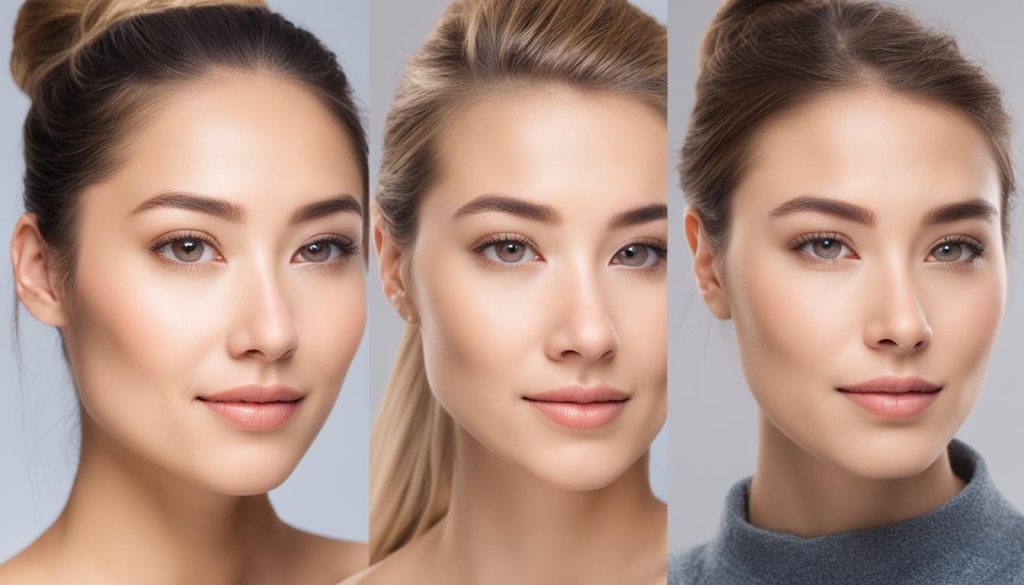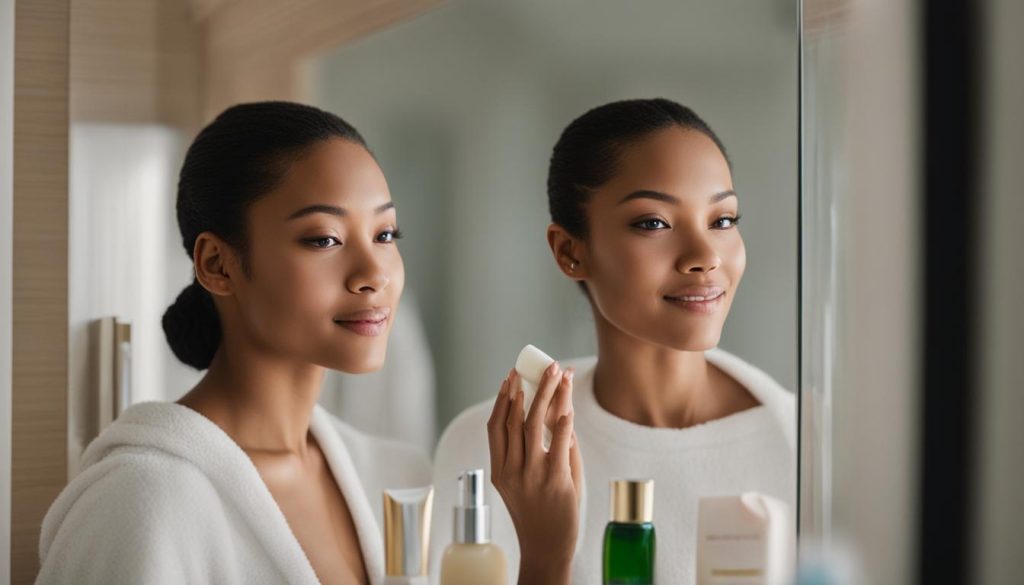Discovering the best skincare routine for oily skin is a personal journey that I have endeavored to demystify. I understand that managing oily skin requires not just dedication, but also the right knowledge and products. My daily routine for oily skin care leverages the power of natural skincare for oily skin, and I swear by its effectiveness. After years of dealing with the shiny T-zone and occasional acne flares, I’ve pinpointed an effective skin care routine for oily skin that strikes the elusive balance between too much and too little.
Oily skin care routine isn’t about stripping away oils; it’s about understanding and working with the skin’s natural oils to achieve a healthy equilibrium. As someone who prides themselves on their skin care routines for oily skin, I’m excited to share the components that make a regimen successful. With the focus on skincare for oily skin types, it’s essential to select products that won’t exacerbate oil production, but rather assist in keeping it in check throughout the day and night.
Whether you’re looking for a natural touch or the latest in dermatologist-approved solutions, I’m here to guide you through a tailored skin care routine specially formulated for our oily skin kin. Let’s dive in and explore how to balance, nurture, and respect our skin’s unique characteristics—leading to a visage that radiates health rather than unwanted shine.
Skin Care Routines for Oily Skin
- Implementing a skin care routine for oily skin that includes hydration and sebum control
- Utilizing ingredients like niacinamide and ceramides to maintain healthy skin barrier function
- Adopting a consistent daily routine for oily skin care to effectively manage oiliness
- Emphasizing the importance of non-comedogenic formulas to avoid clogged pores
- Recognizing the essential nature of sun protection in any oily skin care strategy
Understanding Oily Skin and Its Challenges
As someone who has navigated the complexities of oily skin, I’ve come to appreciate the importance of a personalized oily skin routine. Recognized by experts, including the American Academy of Dermatology, this skin type is characterized by an overproduction of sebum leading to a shiny complexion and a propensity for acne. Interestingly, it often exhibits fewer fine lines and wrinkles. To better grasp how to care for oily skin and select appropriate oily skin care products, a dive into the science behind sebum, common myths, and influential factors is crucial.

Examining the Role of Sebum in Oily Skin
Sebum, the skin’s natural oil, plays a vital role in maintaining our skin’s health. However, when it’s produced in excess, it can lead to the glossy aspect often associated with oily skin. By taking a skin care routine quiz or observing my T-zone about 30 minutes post-cleanse, I’ve learned to measure my skin’s oil levels and adapt my regimen accordingly.
Common Misconceptions About Oily Skin
I’ve encountered plenty of myths around oily skin, such as the notion that moisturization could exacerbate oiliness. Strikingly, proper hydration is paramount even in oily skin care. It’s essential to debunk these misconceptions to avoid inadvertently harming our skin’s balance and health.
Genetics and Environmental Factors Impacting Oily Skin
Through my journey, I’ve realized that genetics and environment significantly impact oily skin. Such insights have inspired me to take a comprehensive what does my skin need quiz to determine which factors are in play for me personally. Whether it’s the climate I live in or the foods I consume, these aspects can either mitigate or amplify the challenges I face with my oily skin routine.
The Importance of Key Ingredients in a Skin Care Routine for Oily Skin
When I set out to refine my skin care routine for my oily skin, I knew that understanding the key ingredients was essential. To share these effective oily skin care tips, I’ve focused on ingredients proven to make a difference. Incorporating them into your regimen is pivotal for achieving oil control skincare while maintaining the integrity of your skin’s barrier.
First, there’s hyaluronic acid, a powerful humectant that keeps my skin hydrated without adding any oiliness. Then, niacinamide and ceramides have become staples in my best skin care routine for oily skin, soothing my skin and fortifying its natural defenses, respectively. And let’s not forget retinol, the transformative agent that has significantly improved my skin’s texture and radiance while helping to manage the signs of aging.
Let me break down why these ingredients are game changers:
- Hyaluronic Acid: Provides essential hydration by drawing moisture from the environment into the skin.
- Niacinamide: Soothes inflammation, minimizes the appearance of pores, and regulates oil production.
- Ceramides: Strengthen the skin’s barrier to lock in moisture and protect against environmental aggressors.
- Retinol: Accelerates cell turnover, evens out skin tone, and prevents congestion in the pores.
It’s clear that non-greasy, non-comedogenic products containing these vital ingredients are the cornerstone of any effective oily skin care strategy. When I choose moisturizers and sunscreens, I am careful to select those specially designed for oily skin types to prevent exacerbating my skin’s natural oil production.

Maintaining an oil control skincare regimen doesn’t have to be daunting. With the right ingredients and products, I’ve turned what once felt like a challenge into a simple, daily routine that leaves my skin balanced and healthy. For anyone looking to master their skincare, remember: the key is in the ingredients.
Step-by-Step Morning Skin Care Routines for Oily Skin
Embarking on my daily routine for oily skin care, I start the day with a regimen tailor-made for my skin type. To ensure I’m following the best skincare routine for oily skin, my morning ritual is a meticulous series of steps designed to combat excess sebum while nurturing my skin’s health.
Choosing the Right Cleanser
I begin with a foaming gel cleanser, ideal for skincare for oily skin. It lifts away the excess oil that has built up overnight, purifying my pores without stripping the skin of its essential moisture barrier. This equilibrium is crucial because a disrupted barrier can lead to increased oil production—a classic pitfall to be avoided in oily skin care.
Using Toner for Balanced Oil Control
Following cleansing, an alcohol-free toner enters the scene, a key player in my best skin care routine for oily skin. This step rids my complexion of any impurities the cleanser might have missed and helps to refine my pores. It’s a soothing middleman that preps my skin for the subsequent moisturizing step, ensuring that no residue is left behind.
Protective and Lightweight Moisturizing
Proper hydration comes next, with a light, oil-free moisturizer packed with ceramides, niacinamide, and hyaluronic acid. The non-comedogenic formula respects the intricacies of my oily skin, providing necessary moisture without adding to the oil levels. It’s a balancing act that leaves my skin soft and supple without a hint of unnecessary shine.
The Necessity of SPF Protection
My final morning gesture is the application of a broad-spectrum, oil-free sunscreen—or a moisturizer incorporating SPF to shield my skin from UV damage. This step not only protects against sun-related aging but is also integral in helping to regulate my skin’s oil production throughout the heat of the day, thus maintaining a matte finish.
Perfecting my best skincare routine for oily skin has been a personal triumph. With each product and every step thoughtfully selected, I’ve mastered my morning skincare for oily skin and turned it into a cherished ritual that prepares me to face the day with confidence.
Gentle Yet Effective Nighttime Regimen for Managing Oily Skin
When dusk falls, my daily routine for oily skin care transitions into a careful regimen designed to balance and restore. A guiding principle for my nighttime routine is the meticulous removal of makeup before bed. This is a non-negotiable step in avoiding pore congestion and setting the stage for restorative treatments that follow. By ensuring every trace of cosmetics is eliminated, I reduce the risk of blemishes and prepare my skin for a more effective absorption of subsequent products.
Importance of Removing Makeup Before Bed
My experience compels me to convey just how crucial it is to free your skin from makeup every night. This elimination prevents unwelcome clogs in your pores and allows your skin to breathe and heal as you sleep. I stand by using gentle yet effective removers that work for oily skin care without leaving any residue that can exacerbate oiliness.
Introducing Exfoliation to Your Nightly Routine
Exfoliation is a game-changer in managing oily skin, specifically products that contain salicylic acid. I incorporate this step judiciously—just enough to slough away dead skin cells without overstimulating sebum production. Gentle exfoliation assists in keeping my skin’s oil levels under control and enhances the efficacy of other skincare products by granting them unhindered access to the deeper layers of my skin.
Restorative Treatments and Serums for Oily Complexions
In my final act of nighttime skincare for oily skin, I turn to trusted serums and treatments. Products enriched with niacinamide or retinol have earned a permanent spot in my routine. They diligently work overnight to target issues like enlarged pores and persistent acne while also promoting skin renewal. My commitment to using non-greasy formulas for these serums and moisturizers ensures that I wake up to a complexion that feels balanced and replenished—not burdened with excess oil.
FAQ
What makes up the best skincare routine for oily skin?
The best skincare routine for oily skin includes gentle cleansing, toning to balance oil production, using oil-free and non-comedogenic moisturizers and sunscreens, and incorporating ingredients like niacinamide, hyaluronic acid, and salicylic acid to manage sebum levels effectively. It’s essential to hydrate without adding oil and ensure sun protection to maintain a balanced complexion.
How can I determine if I have oily skin?
You can assess if you have oily skin by observing your T-zone (forehead, nose, and chin) around 30 minutes after cleansing. If it’s shiny and feels greasy, you likely have oily skin. A skin care routine quiz or the “what does my skin need quiz” may also help determine your skin type by analyzing your concerns and symptoms.
Are there common misconceptions about caring for oily skin?
One common misconception is that people with oily skin don’t need to moisturize. In reality, hydrating the skin is crucial, as lack of moisture can lead to an increase in oil production. It’s important to use lightweight, non-comedogenic moisturizers designed for oily skin. Another misconception is that harsh, drying products are beneficial, but they can strip the skin and aggravate oiliness.
What environmental factors can impact oily skin?
Climate, humidity, and pollution can exacerbate oily skin. For example, high humidity can increase sebum production, leading to a shinier complexion. It’s important to adapt your oily skin care routine to environmental changes and protect your skin with suitable products.
Why are ceramides, niacinamide, and hyaluronic acid important in oily skin care routines?
Ceramides help strengthen the skin’s barrier function, niacinamide is known for its anti-inflammatory properties and ability to regulate oil production, and hyaluronic acid provides essential hydration without adding oil, maintaining skin balance, and preventing overproduction of sebum.
What type of cleanser should be used in the morning skin care routine for oily skin?
For a morning skin care routine, it is recommended to use a foaming gel cleanser that can effectively cleanse excess oil without over-drying or disrupting the skin’s natural barrier.
Is toner necessary for oily skin, and what are its benefits?
Yes, a toner can be helpful for oily skin as it helps remove any residual impurities after cleansing and can assist in balancing pH levels and oil production. An alcohol-free toner is recommended to avoid drying out the skin.
How can I protect my oily skin from the sun?
Oily skin should be protected using a broad-spectrum sunscreen that’s oil-free with at least SPF 15. Sunscreens that offer mattifying properties are especially suitable for oily skin types to prevent added shine.
Why should makeup be removed before bedtime, especially for those with oily skin?
Removing makeup is crucial as it can mix with the day’s oil build-up and clog pores, leading to breakouts. Thorough cleansing before bed prevents this, keeping your skin clear and able to breathe and recover overnight.
How can exfoliation help with oily skin, and how often should it be done?
Exfoliation removes dead skin cells that can clog pores and helps regulate oil production. For oily skin, gentle exfoliation with products containing salicylic acid is beneficial and can be done 2-3 times a week, depending on skin sensitivity and product directions.
What types of serums are recommended for night-time use on oily skin?
Serums with niacinamide are great for controlling oil and reducing redness, while retinol can improve texture and pores. Look for non-greasy, hydrating formulas to nourish the skin without increasing oiliness.






